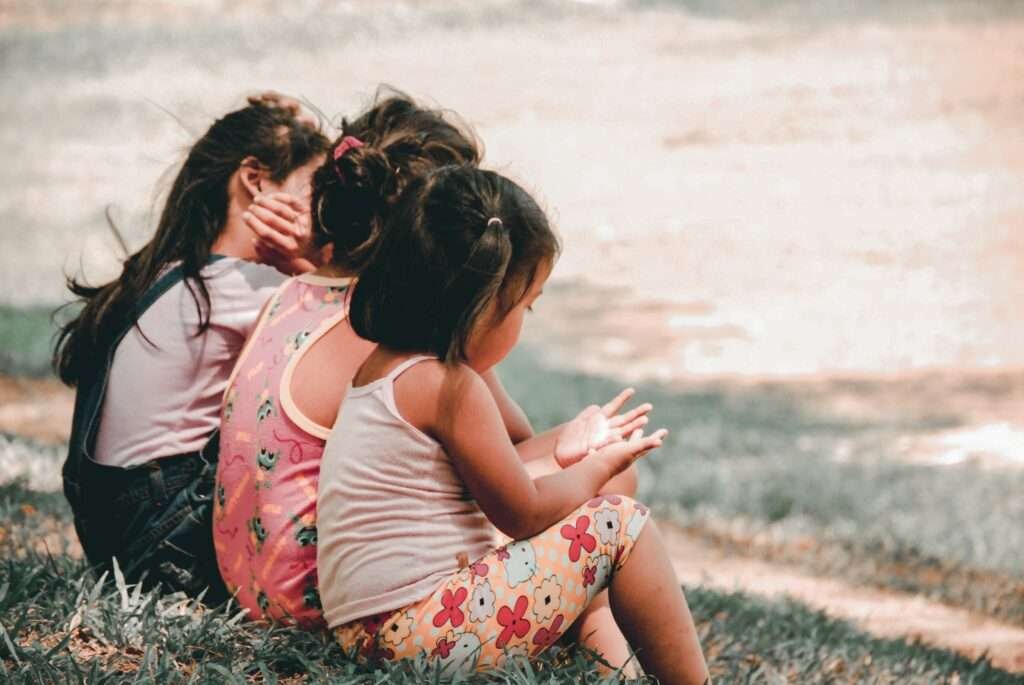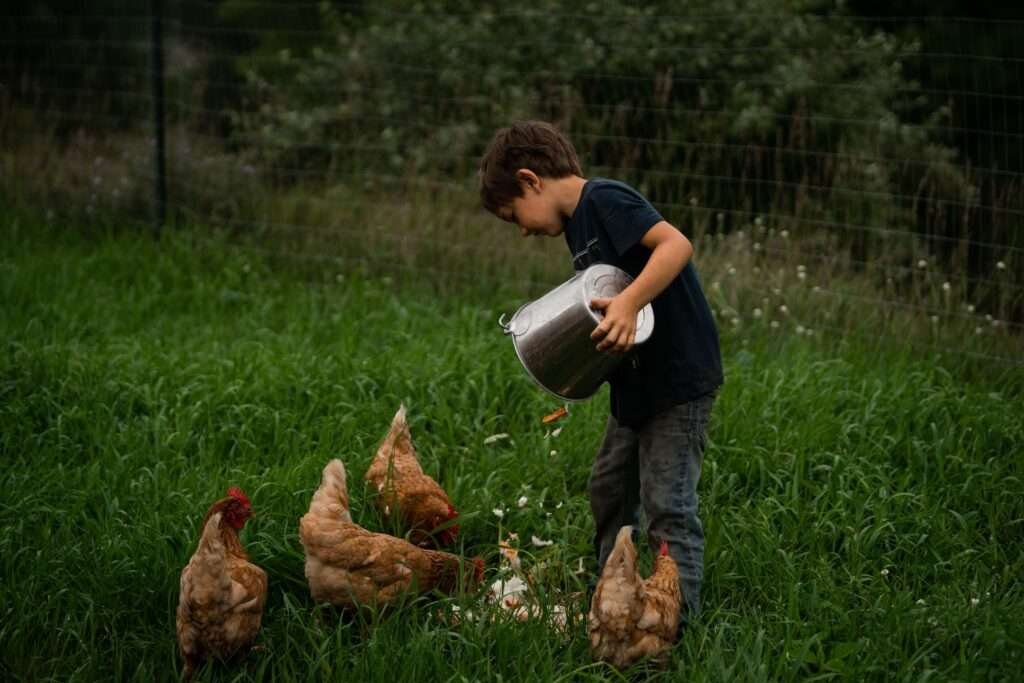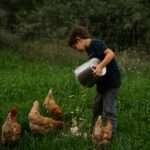In an era of digital screens and fast-paced lifestyles, the simple act of raising chickens can offer a profound and multifaceted educational experience for children. Beyond the initial allure of fluffy chicks and fresh eggs, the world of chicken keeping holds a treasure trove of opportunities to teach kids vital life skills, foster a sense of responsibility, and nurture empathy and compassion. This article will delve into the enriching journey of teaching kids through raising chickens, exploring the valuable lessons it imparts and offering practical guidance on engaging young minds while navigating the various aspects of chicken care.
Lessons Beyond the Coop
Raising chickens is an educational adventure that extends far beyond the boundaries of the coop. As children care for chickens, they embark on a learning journey that encompasses biology, animal behavior, agriculture, and sustainability. This hands-on approach allows kids to connect theoretical knowledge with tangible experiences, making learning engaging and memorable. Whether it’s observing a broody hen’s instinctual behavior or understanding the nitrogen cycle through composting chicken waste, every aspect of chicken care becomes an opportunity for teaching kids through raising chickens.
Practical Outcomes
Responsibility: One of the most profound lessons that raising chickens imparts upon children is the cultivation of responsibility. Assigning age-appropriate tasks empowers kids to take an active role in the well-being of their flock. From refilling waterers and distributing feed to cleaning the coop, these responsibilities instill a sense of duty that extends beyond the realm of chicken care. Setting clear expectations, creating routines, and praising their efforts reinforces a foundational understanding of commitment and accountability.
Connections with Animals: Caring for living creatures fosters empathy and compassion in a way that textbooks cannot replicate. The unique bond that forms between children and their chickens transcends words. Kids often develop an intuitive understanding of their feathered companions’ emotions and needs, leading to acts of kindness such as providing extra comfort during molting or crafting cozy shelters for cold nights. These moments of empathy not only enrich the lives of the chickens but also sow the seeds of empathy that can blossom into lifelong compassion.
Problem-Solving and Decision-Making: The chicken coop becomes a classroom for teaching kids through raising chickens that serve well beyond their chicken-keeping years. In the face of challenges such as predators or health concerns, children are prompted to devise solutions and make informed decisions. Problem-solving skills are honed as they troubleshoot issues, implement preventative measures, and strategize ways to keep their flock safe and healthy. These experiences teach resilience, adaptability, and critical thinking—skills essential for navigating life’s complexities.

Math and Science by Teaching Kids Through Raising Chickens
Who knew that math and science could find their way into the humble chicken coop? Engage kids in simple activities like counting eggs, measuring feed portions, or observing incubation and hatching patterns. This encourages practical mathematical and scientific literacy. From calculating egg production rates to noting temperature fluctuations in an incubator there are many related tasks. These small interactions foster a love for learning while grounding theoretical concepts in practical applications.
Counting and Measuring: From tallying the number of eggs collected each day to measuring out precise feed portions, kids have the opportunity to practice counting. They learn to record data, track trends, and make connections between their actions and outcomes. As they observe the correlation between feed consumption and egg production, they gain an understanding of cause and effect.
Incubation and Hatching: The incubation process presents a fascinating arena for scientific exploration. Kids can record temperature and humidity readings, charting the optimal conditions for successful hatching. Watching the transformation of an egg into a chick is a firsthand lesson in biology and the miracle of life. Discussing topics like embryonic development becomes not just a theoretical exercise but a captivating reality.
Observation and Documentation: Encourage children to maintain a chicken journal where they document observations. They can note changes in behavior, and track the growth and development of their flock. This practice reinforces scientific methodology, promoting careful observation, data collection, and analysis. Over time, kids will witness seasonal variations in egg production and the influence of their care routines.
Communication and Teamwork
Teaching kids through raising chickens also supports effective communication and teamwork within a family unit. Assigning roles, sharing responsibilities, and coordinating efforts create an atmosphere of collaboration that extends beyond the coop. Kids learn to express their needs, listen to others’ perspectives, and work collectively to achieve common goals. These skills transcend the care of chickens and become valuable tools for navigating interpersonal relationships throughout their lives.
Assigning Roles: Allocate specific responsibilities to each family member based on their interests, strengths, and availability. This encourages open dialogue about individual contributions and promotes a sense of ownership over the flock’s well-being.
Sharing Insights: Regular family discussions about chicken care provide a platform for kids to share their observations, concerns, and ideas. Creating a safe space where children feel heard and valued nurtures their ability to communicate effectively.
Coordinating Efforts: Managing a flock requires coordinated efforts, akin to managing a small business. Kids can learn valuable lessons in task delegation, time management, and collaborative problem-solving as they work together to ensure the chickens’ needs are met.

Chicken Well-Being While Teaching Kids Through Raising Chickens
While the educational benefits of raising chickens with kids are undeniable, safety remains a paramount concern. Engaging children in chicken care requires guidance to ensure both their well-being and the chickens’. Teaching proper handling techniques, demonstrating gentle interactions, and fostering a sense of respect for the birds are essential components of this process. By learning to read chicken behaviors and respond appropriately, kids develop a sense of responsibility that extends to ensuring the comfort and health of their feathered friends.
As kids immerse themselves in the world of chicken care, safety remains paramount. Ensuring safe interactions between children and chickens involves guidance, patience, and an unwavering commitment to the well-being of both.
Proper Handling Techniques: Teach kids how to approach, handle, and hold chickens gently. Emphasize the importance of calm movements and minimal stress to avoid frightening the birds.
Understanding Chicken Behavior: Educate children about reading chicken behavior cues, such as relaxed body language, contented clucking, and comfortable posture. By recognizing signs of distress or discomfort, kids can adjust their interactions accordingly.
Supervised Engagement: Initially, oversee interactions between younger children and chickens to ensure that both parties feel comfortable and secure. Gradually grant more autonomy as kids become adept at understanding chicken behaviors.
Navigating End-of-Life Conversations
The cycle of life is an intrinsic aspect of chicken keeping, and it offers an opportunity for important conversations with children. Addressing the topic of chicken mortality requires sensitivity and openness. As chickens age or face health challenges, discussing the natural course of life, the concept of mortality, and the importance of providing compassionate care becomes a lesson in empathy, acceptance, and emotional growth.
Exploring Natural Life Cycles: Introduce the concept of the life cycle early on, discussing how animals, like humans, have a finite lifespan. Use age-appropriate language to explain the concepts of birth, aging, and eventual passing.
Fostering Empathy and Coping Skills: Use these moments to nurture empathy and compassion. Encourage children to reflect on the positive impact they’ve had on their chickens’ lives and emphasize the significance of providing loving care.
Honoring Memories: Create a space or activity for kids to commemorate their chickens’ lives—a memorial garden, a drawing, or a simple remembrance ceremony. This practice helps children process grief and develop healthy coping mechanisms.

Forward Looking Learnings
The transformative power of raising chickens with kids extends beyond the practical aspects of coop maintenance and egg collection. It’s a journey of discovery, growth, and connection that enriches children’s lives in ways that textbooks and screens cannot replicate. By engaging with chickens, kids embark on a path of continuous learning, where responsibilities become lessons, and interactions become opportunities for personal development.
Life-Long Lessons and Lasting Impact As children take on the roles of caretakers, they internalize values and qualities that will serve them well into adulthood. Responsibility becomes second nature, setting the stage for dependable, accountable behavior. The empathy and compassion cultivated through chicken care extend beyond the coop, guiding kids to become considerate and empathetic individuals.
A Foundation for Future Endeavors The skills honed through chicken raising lay a foundation for success in various domains. Problem-solving and critical thinking become ingrained habits, supporting children as they navigate challenges and pursue their goals. Effective communication and teamwork fostered in the coop are skills they’ll carry into their relationships and careers.
A Rewarding Investment of Time and Effort Raising chickens with kids demands time, effort, and patience, but the rewards are immeasurable. Witnessing the joy on a child’s face as they collect their first egg, confidently handle a chicken, or comfort a distressed bird is a testament to the impact of this educational endeavor.

Tips for a Thriving Chicken-Keeping Experience
- Start Small: Begin with a manageable flock size that suits your family’s capabilities and available space.
- Age-Appropriate Tasks: Assign tasks that align with each child’s age and capabilities, gradually increasing their responsibilities as they mature.
- Supervised Learning: Initially, supervise interactions closely to ensure both children and chickens feel safe and comfortable.
- Open Dialogue: Foster open communication, encouraging kids to share observations, concerns, and ideas about the flock.
- Safety First: Prioritize safety by teaching proper handling techniques, emphasizing gentle interactions, and maintaining a predator-resistant coop.
- Celebrate Achievements: Acknowledge and celebrate milestones and accomplishments, reinforcing the positive impact of their efforts.
Teaching Kids Through Raising Chickens
As the days turn into weeks and the weeks into years, the lessons learned from raising chickens become an integral part of a child’s upbringing. The memories forged within the confines of the coop—whether it’s a victorious moment of egg collection, a heartwarming act of kindness towards a sick chicken, or a reflective conversation about life and loss—leave an indelible mark.
The experiences gained from chicken raising are not confined to childhood; they remain etched in the heart and mind, contributing to the holistic development of each child. When those kids grow into adults, they carry with them a unique set of skills, values, and memories that enrich their lives and the lives of those around them.
In the enchanting realm of raising chickens with kids, the coop becomes a classroom, the chickens become teachers, and the lessons become a legacy that endures through generations. So, whether you’re guiding your child as they gather eggs, gently cradle a chick, or bid farewell to an old friend, know that you’re nurturing more than just a flock—you’re fostering a love for learning, responsibility, empathy, and connection that will flourish long after the feathers have settled.





